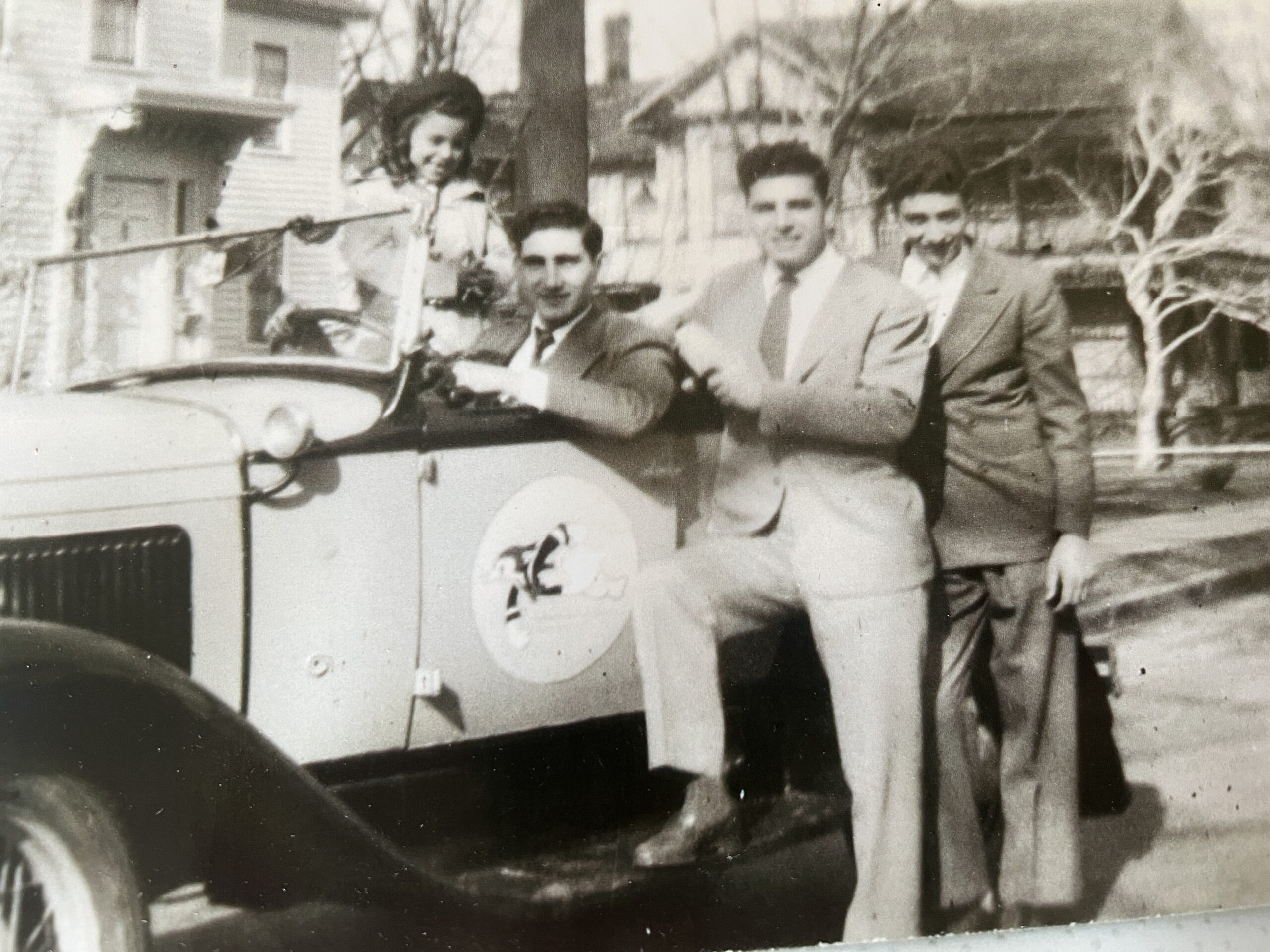PODCAST-IF I EVER DIE

My father often started his sentences with the phrase, “If I ever die…”
I never corrected him. I didn’t say, “Don’t you mean, when you die? You understand that dying is inevitable, right?”
Instead, I wondered how he thought his life might play out. Did he believe he’d be carried off to heaven in a fiery chariot like Elijah in the Bible? Probably not.
My father’s pronouncement didn’t seem to be influenced by any theological theories. The man simply disregarded his mortality, which resulted in his making risky choices, choices that evidenced questionable judgment.
A man of irrational optimism and mesmerizing confidence, my father possessed great skills of persuasion. In his eighties, he convinced seven fellow octogenarians to help him detach then carry a wrought iron porch from our home to the back of our one-acre lot. He wanted to create a clubhouse for his horseshoe buddies.
So, during a raging thunderstorm, as lightning crisscrossed the sky, these old guys with shoulder, knee, and heart problems, staggered down the yard with the intact porch. All I could think about was how many ambulances we’d need to call and the lawsuits the stunt would engender.
Another time, my father visited me in Virginia the week before he was scheduled for cardiac bypass surgery. Our neighbor invited us to go to a horse stable to pick up manure for her garden. We were to follow her truck, then help her shovel. She wanted the freshest manure, so she steered into a steaming mountain of droppings. Her pick-up sank several inches. As she spun her wheels, horse poo splattered in all directions. Despite my protests, Dad stepped into the equine doody, leaned his shoulder against the two-ton truck and pushed hard, to no avail. Fearing my father’s heart would fail, I flagged down a farmer who used a tractor to haul the pick-up out of the pit.
When my father was ninety-one, I flew to Florida for a visit. I hadn’t been a passenger in his car for a while. As he drove down a highway in Ocala, Dad looked at an overhead sign. “What do you think that says?” The tone of his query indicated that he believed there could be more than one correct answer.
I gasped. The letters were about the same size as that HOLLYWOOD sign in California. I told my father he needed to give up driving. After three attempts, my mom finally hid the keys in a place my father couldn’t find. So, my dad used his golf cart to get around, a cart with faulty brakes and a broken headlight. After a couple mishaps, my mother hid those keys. One night, my father hot wired the cart, then headed for a neighborhood pinochle game. Soon after, my cousins made the golf cart disappear.
At ninety-two, my father’s health declined rapidly. He asked to come to Virginia, where I live. He felt too ill to fly. So, my intrepid cousins decided to drive my parents to Charlottesville. We wondered if we might find ourselves in a Little Miss Sunshine situation—the movie where on a family road trip, the feisty grandpa quietly passes to the Great Beyond in the back seat of a van. We discussed what to do if my dad died on the way. We all agreed—they’d just keep driving. Sick as he was, right before they left, my father tried to convince my cousins to bring him to one last neighborhood pinochle game.
Upon arrival in Charlottesville, my father entered hospice care and passed away two weeks later. Even though, he’d been ill for months and I watched him become weak and disoriented, I felt shocked when he died. He had spent his life taking risks and beating the odds. At a subconscious level, I’d bought into his, “IF I ever die…” perspective.
To this day, I still expect a phone call from him, telling me about his latest ridiculous exploit. I do feel relieved that I no longer have to worry about him endangering himself or some innocent bystander. But the truth is, I miss him. That wild man brought life to every party.
Not long ago, when discussing the future with a friend, I inadvertently said, “IF I ever die…” She looked surprised. I’ll admit, I’d surprised myself.
Why did I say that? Clearly, I am aware that I will die someday.
Perhaps, six years after my father’s death, I am finally realizing the unspoken sentiment underlying that phrase he often used. Regardless how his body failed him, the man intended to pursue joy right to the end.
These days, our nation feels as if it’s on fire. And, come January, our country will re-visit the chaos created by our past and future president. I’ll admit, after the election, my inclination was to retreat to a cozy bunker for four years.
But, why waste this precious life? Despite my despondency being deep and wide, I hope to channel my father and Dylan Thomas by raging against the dying of the light.
(Above photo is of my father, Jimmy Mazzotta, in his Model T car.)

Podcast: Play in new window | Download
As I sit on my couch from Jimmy’s Roadside Furniture I am cherishing his memory. And if I die –!!
Haha!
Your father was a character, Debby. Maybe you got some of your humor and social nature from him. But you certainly aren’t the risk taker that he was!
Loved this, and am certain I would have loved your father as well. I too have exchanged my horror for the current state of things for a commitment to seeking- and spreading- joy. Succumbing to despondency is merely feeding the beast-
Lovely tribute, Deb. We need more people like your dad walking this earth. More often than not, it’s fear that’s the enemy.
Thank you. He was fearless–it was often me who feared what he might do next.
Thank you for the comment. You are right about joy.
Love this piece!
Thank you!
Great piece!
Thank you!
Lovely tribute indeed, Deb. This brought back great memories of your father’s antics. I remember your mom getting exasperated at some of them! He is dearly missed, he brought joy to so many. Now I’m wondering which of our crazy cousins helped on that drive to Charlottesville?
Thank you. He definitely was an antic expert! My cousins who made that drive are on my father’s side of the family, Paul and Michi. I don’t think you would know them.
I hope you are well.
Love,
Debby
Hi Debby, throughout this story I had to laugh as I could just picture your dad convincing his friends to move a porch. He had a way about him. Working at Camp Blessing with him, beware when he would say, “Hey, I got a great idea, how about…..”. No matter how many protests he got, he would do his own thing. The campers loved him. We all loved Jimmy and miss him.
Enjoyed your story, Pat
Pat:
Great to hear from you. Were you with him when he almost got arrested for sitting in the arms of a statue? I’m glad I missed that one. I hope you are well. As you know, Eva is in hospice, but seems to be rallying a little physically in that she is over Covid, but her memory is doing a lot of time travelling.
Debby
Hi Debby, I really enjoyed this. Yes, your Dad was quite the character. Loved his sense of humor – and I’m not always sure he thought he was trying to be funny! “If I ever die …” might be one of those times. I often remember our trip to Sicily, it was just three of us, your Dad, myself, and my friend Bernet. After our tour, we rented a car and spent some extra days with your Dad’s family there and got a “behind the scenes” view of the island and its people. Great memories.
P.S. I do hope and pray that as the year rolls on you will become more optimistic about the country and its future! 🙂
Hi: I’m just seeing this. Great to hear from you Thank you for your comments. Wow–I forgot you went to Sicily with my father. That must have been quite a trip. My father always colored outside the lines, which even as a child, made me worried about getting in trouble.
I agree with you–lots of anxiety about current affairs. Yikes. I hope democracy will survive.
with affection and lots of good memories,
Debby